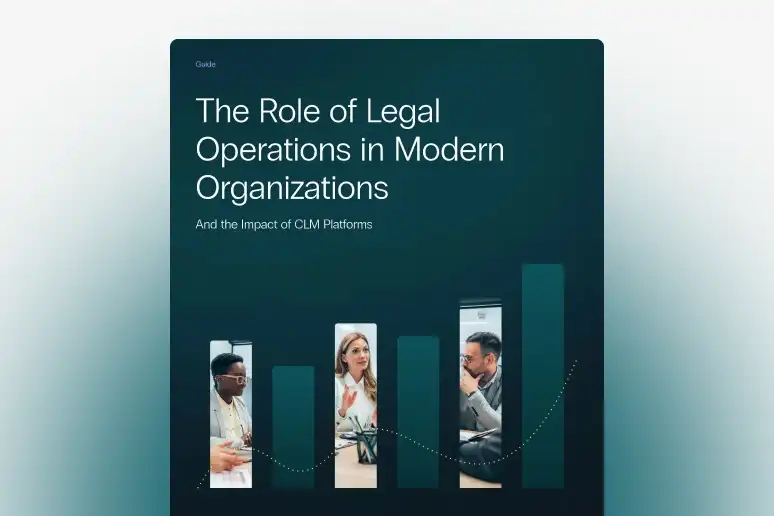Legal vs. Legal Operations: What’s the Difference?

- Last Updated: Nov 21, 2025
- 15 min read
- Sirion
For decades, in-house lawyers were responsible for managing everything that Legal touches — contracting, compliance regulation, spend management, and more. With so much on their plate, they ended up with less time to actually practice law and be drivers of the business.
That is, until the introduction of legal operations. Over the last few decades, legal ops teams have proven their value for in-house legal functions. But not everyone has wanted to jump on board, and we often see these roles continuing to function as one entity instead of two.
Whether due to budget constraints, hesitancy to hand over legal tasks, or otherwise, some enterprises have yet to fully grasp how implementing a legal ops function will help their team.
The key to reaping the benefits of this function comes from understanding the difference between Legal and Legal Ops.
Keep reading to learn how these two functions build their teams, set their goals, and approach their responsibilities.
Who’s On the Team?
Legal
Legal teams include those who have law degrees and focus on practicing law. The only exception you’ll likely find here are Paralegals who need extensive legal knowledge (but no legal degree) to perform their jobs.
This team can include roles for:
- General Counsel
- Legal Counsel
- Commercial/Contracts Counsel
- Labor Counsel
- Litigation Counsel
- Real Estate Counsel
- Regulatory Counsel
Legal Operations
Legal Operations teams include people who may or may not have law degrees. They focus more on the legal department’s general operations, strategies, and efficiency.
The Corporate Legal Operations Consortium (CLOC), a global legal operations community, has named 12 core functional areas that legal ops teams can focus on to drive operational excellence. That’s why you’ll see legal ops teams made up of those with finance, technology, procurement, and project management backgrounds.
According to their State of the Industry Report, many legal ops teams report a few common responsibilities.
- Process development and project management – 92%
- Data analytics – 84%
- Technical and process support – 84%
- Vendor management – 84%
- Financial management – 81%
It makes sense that, with different professionals making up these roles, each team will have their own objectives.
What are the Goals for Legal vs. Legal Ops?
Let’s get the obvious out of the way. Every legal function has different goals. What you prioritize will depend on your industry, unique business needs, and larger company objectives.
Still, some overarching contract management goals tend to apply across the board for many legal and legal operations teams.
Legal
Your legal team tends to focus on being a strategic partner to the business. They’re more concerned with the “what” and “why” of your business agreements.
To that end, Legal wants to:
- Reduce Time-to-Contract — Get contracts authored, reviewed, negotiated, and executed faster to get more deals going.
- Lower External Counsel Costs — Keep contracting tasks in-house and reduce the amount spent on external help.
- Improve Legal Reputation and Relationships — Build positive collaboration with other teams and bust the age-old reputation of Legal being the “Department of ‘No.’”
- Use Legal Knowledge to Support the Enterprise — Make strategic decisions about business contracts that limit risk, maintain compliance, and increase revenue.
Legal Operations
On the other hand, your legal operations team wants to build processes and implement solutions that make your lawyers’ lives easier and give them more time to focus on their own goals. They’re much more focused on the “how” of your in-house legal function.
Legal Ops want to:
- Empower In-House Attorneys — Streamline contracting processes that empower lawyers to drive business instead of putting out fires.
- Improve Vendor Management — Leverage contract data to identify your strongest vendors and improve supplier relationships for continued performance and cost efficiency.
- Drive Cost-Savings — Partner with internal teams and use historical data to highlight areas ripe for spend improvement.
- Enhance Efficiencies Company-Wide — Share process improvements with other departments for heightened efficiency across your enterprise.
On top of working toward different — albeit connected — goals, Legal and Legal Ops will approach the tasks that contribute to those objectives a bit differently.
Related Read: Legal Ops Best Practices
How Does Each Function Approach Tasks?
Remember how we said lawyers focus on the “what” and “why” of business contracting while legal operations focus on the “how?”
That’s not to say that lawyers don’t care how something gets done. Of course, they do. But it does mean that they’ll trust Legal Ops to build processes and onboard solutions that make their lives easier.
That trust plays out in a few select areas.
1. Cost Savings
When lawyers are too bogged down with busy work, they rely more heavily on external counsel to offer strategic business advice — the kind they want to provide.
As any legal team knows, Big Law firms aren’t cheap. So, every month, Legal ends up wasting thousands of dollars on external services that the business hired them to do in the first place.
Legal Ops can implement workflows and processes that automate contracting work, give lawyers more time to strategize for the business, and reduce their reliance on external counsel. Not only does this lower costs, but it frees up that budget to be used in better ways.
2. Contracting Processes
Lawyers can spend hours drafting contracts and reviewing and renegotiating terms by hand. All those hours eat into the time they would prefer to use focusing on strategic business decisions.
Instead of having lawyers—who want to use their legal knowledge to improve the business—spend time improving contracting processes, Legal Ops can take over and identify areas for optimization and streamlining.
3. Contract Templates
Too often, lawyers have to send back contracts because a vendor or partner used the wrong template containing outdated or deviating terms. Imagine how much time and effort that wastes trying to get deals across the finish line.
As a solution, Legal Ops can house documents in a contract repository, standardize templates, build clause libraries, and establish better authoring processes.
The result? Counterparties use the right legal-approved contracts with language that aligns with your playbook.
4. M&A Due Diligence
From gathering the necessary documentation to reviewing thousands of pages of existing contracts and financial data, proper M&A due diligence can take weeks or even months.
Even for the most promising of deals, do lawyers have that kind of time to spare? No.
Instead, Legal can rely on Legal Ops to perform due diligence and check compliance, vendor, and financial factors. Once Legal Ops passes on that data, your lawyers can head straight into strategy meetings, fully prepared.
5. Technology Implementation
How many lawyers do you know that constantly scout the newest available legal tech? Probably not many.
Lawyers aren’t staying up-to-date on the latest tech landscape. But Legal Ops is.
Rather than have a lawyer spend hours researching tools, someone on Legal Ops already knows the best CLM options to offer. That saves your in-house counsel a ton of time scouting potential solutions and helps ensure they only see the best contract AI platforms to support your legal team.
Drive Business Together as One Legal Function
Legal ops teams have a prime opportunity to transform how in-house lawyers succeed within (and for) their enterprises—as long as they use the right contracting technology to support their efforts.
By leveraging Sirion’s AI-native CLM platform, your legal operations team can centralize, standardize, and optimize your contracting operations, giving lawyers more time to focus on strategic tasks and drive business.
See how you can fine-tune your operations using our no-code interface. Schedule a demo today.


